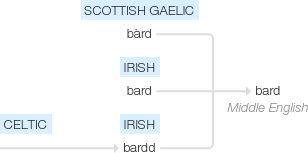Bard
Middle English: from Scottish Gaelic bàrd, Irish bard, Welsh bardd, of Celtic origin. In Scotland in the 16th century it was a derogatory term for an itinerant musician, but was later romanticized by Sir Walter Scott.
wiktionary
(15th c.) from Scottish Gaelic bàrd, from Old Irish bard, from Proto-Celtic *bardos(“bard, poet”), from Proto-Indo-European *gʷerH-(“praise”), and reinforced by Latin bardus, borrowed from Celtic. Cognate with Latin grātus(“grateful, pleasant, delightful”), Sanskrit गृणाति(gṛṇāti, “calls, praises”), Old Church Slavonic жрьти(žrĭti, “to sacrifice”).
From French barde. English since the late 15th century.
etymonline
bard (n.)
"ancient Celtic minstrel-poet," mid-15c., from Scottish, from Old Celtic bardos "poet, singer," from Celtic *bardo-, possibly from PIE *gwredho- "he who makes praises," suffixed form of root *gwere- (2) "to favor."
In historical times, a term of great respect among the Welsh, but one of contempt among the Scots (who considered them itinerant troublemakers). Subsequently idealized by Scott in the more ancient sense of "lyric poet, singer." Poetic use of the word in English is from Greek bardos, Latin bardus, both from Gaulish.
All vagabundis, fulis, bardis, ſcudlaris, and ſiclike idill pepill, ſall be brint on the cheek, and ſcourgit with wandis, except thay find ſum craft to win thair living. [from a 16c. list of historical laws of Scottish kings, in Sir James Balfour, "Practicks: Or, a System of the More Ancient Law of Scotland," 1754]
